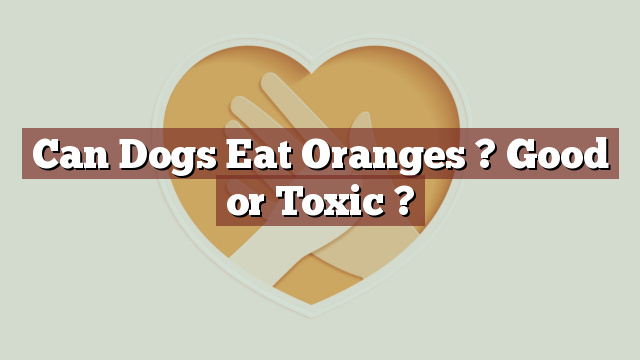Can Dogs Eat Oranges? Good or Toxic?
As pet owners, we always strive to ensure the well-being and health of our furry companions. One crucial aspect of their care is their diet, which includes knowing which foods are safe for them to consume. In this article, we will delve into the question of whether dogs can eat oranges and explore the potential risks and benefits associated with feeding this citrus fruit to our canine friends.
Nutritional Value of Oranges: Vitamins, Fiber, and Antioxidants
Oranges are well-known for their high nutritional value. They are packed with essential vitamins, including vitamin C, vitamin A, and various B vitamins. These vitamins play a vital role in supporting immune function, promoting healthy skin and coat, and aiding in the overall well-being of dogs. Additionally, oranges are a good source of dietary fiber, which can contribute to healthy digestion and weight management. Moreover, oranges contain antioxidants that help combat the damaging effects of free radicals in the body.
Can Dogs Eat Oranges? Exploring Safety and Toxicity
Can dogs eat oranges? Yes, dogs can safely consume oranges in moderation. While oranges are not toxic to dogs, it is important to note that some precautions should be taken when introducing this fruit into their diet. The high sugar content in oranges may cause gastrointestinal upset if consumed in large quantities, leading to symptoms such as diarrhea or an upset stomach. Therefore, oranges should be offered as an occasional treat, rather than a staple food in a dog’s diet.
It is also crucial to remove the orange peel and seeds before giving oranges to dogs. The peel can be difficult for dogs to digest and may cause blockages or choking hazards. The seeds, on the other hand, contain small amounts of cyanide, which can be harmful if ingested in large quantities.
Potential Risks and Benefits of Feeding Oranges to Dogs
Feeding oranges to dogs can have both risks and benefits. On the positive side, the vitamins and antioxidants present in oranges can provide numerous health benefits for dogs. The vitamin C in oranges, for example, can support the immune system and help protect against certain diseases. The fiber content can aid in digestion and regulate bowel movements.
However, it is important to be mindful of the risks associated with feeding oranges. The high sugar content can be problematic for dogs with diabetes or those prone to weight gain. Additionally, the acidity of oranges may irritate the digestive system of some dogs, leading to discomfort or upset stomach.
What to Do if Your Dog Eats Oranges: Monitoring and Concerns
If your dog accidentally consumes oranges or you decide to introduce this fruit into their diet, it is essential to monitor their response. Watch out for any signs of gastrointestinal distress, such as vomiting, diarrhea, or loss of appetite. If these symptoms persist or worsen, it is advisable to consult a veterinarian for professional guidance.
Conclusion: Moderation and Consultation for a Healthy Canine Diet
In conclusion, dogs can eat oranges as long as it is done in moderation and with proper precautions. The nutritional value of oranges can provide health benefits for dogs, but the high sugar content and potential digestive issues must be considered. Before introducing any new food into your dog’s diet, it is always best to consult with a veterinarian who can provide personalized advice based on your dog’s specific needs and health conditions. By maintaining a balanced and well-rounded diet, we can ensure the overall health and happiness of our beloved canine companions.
Thank you for investing your time in exploring [page_title] on Can-Eat.org. Our goal is to provide readers like you with thorough and reliable information about various dietary topics. Each article, including [page_title], stems from diligent research and a passion for understanding the nuances of our food choices. We believe that knowledge is a vital step towards making informed and healthy decisions. However, while "[page_title]" sheds light on its specific topic, it's crucial to remember that everyone's body reacts differently to foods and dietary changes. What might be beneficial for one person could have different effects on another. Before you consider integrating suggestions or insights from "[page_title]" into your diet, it's always wise to consult with a nutritionist or healthcare professional. Their specialized knowledge ensures that you're making choices best suited to your individual health needs. As you navigate [page_title], be mindful of potential allergies, intolerances, or unique dietary requirements you may have. No singular article can capture the vast diversity of human health, and individualized guidance is invaluable. The content provided in [page_title] serves as a general guide. It is not, by any means, a substitute for personalized medical or nutritional advice. Your health should always be the top priority, and professional guidance is the best path forward. In your journey towards a balanced and nutritious lifestyle, we hope that [page_title] serves as a helpful stepping stone. Remember, informed decisions lead to healthier outcomes. Thank you for trusting Can-Eat.org. Continue exploring, learning, and prioritizing your health. Cheers to a well-informed and healthier future!

